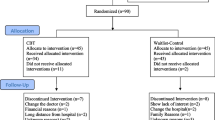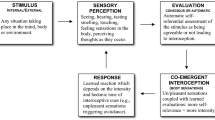Abstract
This study was designed to determine whether participation in group cognitive behavioral therapy (CBT) would result in better glycemic control, higher motivation in diabetes self-management, and improved psychological well-being. The experimental design involved a sample of 60 Malaysian adults having type 2 diabetes for more than a year, drawn from the health clinic at Universiti Sains Malaysia, Penang. Participant volunteers were males and females aged between 20 and 65 years of various ethnic backgrounds. Glycemic control was measured by HbA1c value for each participant with pre- and post-blood tests, while psychological well-being was measured by the Well-being Questionnaire (W-BQ 22) developed by Bradley (1990) to measure depression, mood, anxiety, and various aspects of positive well-being exclusively for diabetics. CBT intervention program and patient education supplements were administered to the experimental group over 3 months, whereas the control group received neither; both groups carried on their normal type 2 diabetes treatment and physicians’ consultations. The results indicated that group CBT improved the mean psychological well-being scores among participants in the experimental group from 37.56 in the pretest to 49.83 in the posttest. The findings of the current study suggested that the therapy could also help diabetics achieve more acceptable HbA1c levels and better adjust to diabetes.
Similar content being viewed by others
References
Western Pacific Declaration on Diabetes Steering Committee. (2008). Plan of Action for the Western Pacific Declaration on Diabetes 2006–2010. Retrieved from http://www.wpdd.org.
Padgett D, Mumford E, Hynes M, Carter R. Meta-analysis of the effects of educational and psychosocial interventions on management of diabetes mellitus. J Clin Epidemiol. 1988;41(10):1007–30.
Snoek F, Skinner T. Psychological counselling in problematic diabetes: Does it help? Diabet Med. 2002;19(4):265–73.
Debono M, Cachia E. The impact of diabetes on psychological well being and quality of life. The role of patient education. Psychol Health Med. 2007;12(5):545–55.
DeVries J, Snoek F, Heine R. Persistent poor glycaemic control in adult Type 1 diabetes. A closer look at the problem. Diabet Med. 2004;21(12):1263–8.
Edmunds S, Roche D, Stratton G, Wallymahmed K, Glenn SM. Physical activity and psychological well-being in children with Type 1 diabetes. Psychol Health Med. 2007;12(3):353–63.
Kramer JR, Ledolter J, Manos GN, Bayless ML. Stress and metabolic control in diabetes mellitus: Methodological issues and an illustrative analysis. Ann Behav Med. 2000;22(1):17–28.
Gavard JA, Lustman PJ, Clouse RE. Prevalence of depression in adults with diabetes: an epidemiological evaluation. Diabetes Care. 1993;16(8):1167–78.
Peyrot M, Rubin RR. Levels and risks of depression and anxiety symptomatology among diabetic adults. Diabetes Care. 1997;20(4):585–90.
Eiser JR, Riazi A, Eiser C, Hammersley S, Tooke JE. Predictors of psychological well-being in types 1 and 2 diabetes. Psychol Health. 2001;16(1):99–110.
Delamater AM, Jacobson AM, Anderson B, Cox D, Fisher L, Lustman P, et al. Psychosocial Therapies in Diabetes Report of the Psychosocial Therapies Working Group. Diabetes Care. 2001;24(7):1286–92.
Malaysia Ministry of Health. Clinical Practice Guidelines (CPG). Management of diabetes mellitus type 2. 2010;Retreived from Ministry of Health. http://www.moh.gov.my/cpgs.
Hill R. What sample size is “enough” in internet survey research. Interpersonal Computing and Technology: An Electronic Journal for the 21st Century. 1998;6(3–4):1–12.
Van Der Ven NC, Chatrou M, Snoek FJ. Cognitive‐Behavioral Group Training. Psychol Diabetes Care. 2000;207–233.
D’Zurilla TJ, Nezu AM. Problem-solving therapy. Handbook of Cognitive-Behavioural Therapies. 2010;3:197–225.
Bradley C, Lewis K. Measures of psychological well-being and treatment satisfaction developed from the responses of people with tablet-treated diabetes. Diabet Med. 1990;7(5):445–51.
Grey M, Boland EA, Davidson M, Yu C, Tamborlane WV. Coping skills training for youths with diabetes on intensive therapy. Appl Nurs Res. 1999;12(1):3–12.
Karlsen B, Idsoe T, Dirdal I, Rokne Hanestad B, Bru E. Effects of a group-based counselling programmeme on diabetes-related stress, coping, psychological well-being and metabolic control in adults with type 1 or type 2 diabetes. Patient Educ Couns. 2004;53(3):299–308.
Van Bastelaar KM, Pouwer F, Cuijpers P, Twisk JW, Snoek FJ. Web-based cognitive behavioural therapy for diabetes patients with co-morbid depression: Design of a randomised controlled trial. BMC Psychiatry. 2008;8(1):9.
Diener E, Suh EM, Lucas RE, Smith HL. Subjective well-being: Three decades of progress. Psychol Bull. 1999;125(2):276–82.
Gregg EW, Beckles G, Williamson DF, Leveille SG, Langlois JA, Engelgau MM, et al. Diabetes and physical disability among older US adults. Diabetes Care. 2000;23(9):1272–7.
McGrady ME, Hood KK. Cognitive-behavioral therapy for adolescents with Type 1 diabetes and subclinical depressive symptoms. Diabetes Manag. 2013;3(3):207–15.
Acknowledgments
The present research has been supported by Post Graduate Research Scheme (PRGS) in Universiti Sains Malaysia.
Author information
Authors and Affiliations
Corresponding author
Rights and permissions
About this article
Cite this article
Alvani, S.R., Zaharim, N.M. & Wynne Kimura, L. Effect of group cognitive behavioral therapy (CBT) on psychological well-being and glycemic control in adults with type 2 diabetes. Int J Diabetes Dev Ctries 35 (Suppl 2), 284–289 (2015). https://doi.org/10.1007/s13410-015-0415-z
Received:
Accepted:
Published:
Issue Date:
DOI: https://doi.org/10.1007/s13410-015-0415-z




